(done-ish) Agents - Heat + Cold
1/151
Earn XP
Description and Tags
I feel like the order is different on this one but don't want to start from scratch so just going to skip the side by side and go with it.
Name | Mastery | Learn | Test | Matching | Spaced |
|---|
No study sessions yet.
152 Terms
rate of heat transfer formula for conduction
(area of contact x thermal conductivity x temperature difference) / tissue thickness
tissues with higher water content conduct (more/less)
MORE!! (muscle has more conductivity than fat)
superficial on skin, subcuteanous tissues/fluids, how deep does it go?
1-3 cm
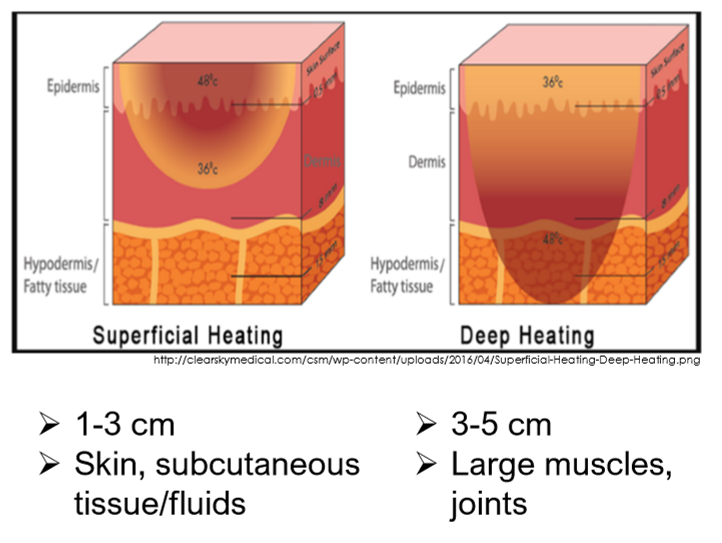
deep over large muscles and joints, how deep does it go?
3-5 cm
types of heat transfer (4)
-conduction
-convection
-radiation
-conversion
this type of heat transfer requires direct contact to transfer energy
CONDUCTION
what is the flow in conduction?
faster (warmer) --> slower (cooler) ..... continues until both are equal
hot packs, paraffin, and cold modalities are examples of ___ modalities
CONDUCTIVE
rate that material transfers heat
thermal conductivity
what has a higher thermal conductivity: muscle or fat?
MUSCLE!!
what has a higher thermal conductivity: 20° water or 0° air?
WATER!
in conduction, larger area = (faster/slower) transfer
FASTER
in conduction, greater temperature gradient = (greater/lesser) change
GREATER!!!
in conduction, deeper tissue = (slower/faster) to change temperatures
SLOWER
in conduction, high conductivity goes ___, low conductivity goes ___
FASTER // SLOWER
hot/cold packs, ice massage, fluidotherapy, paraffin, infrared lamps, and whirlpool are examples of ___
superficial
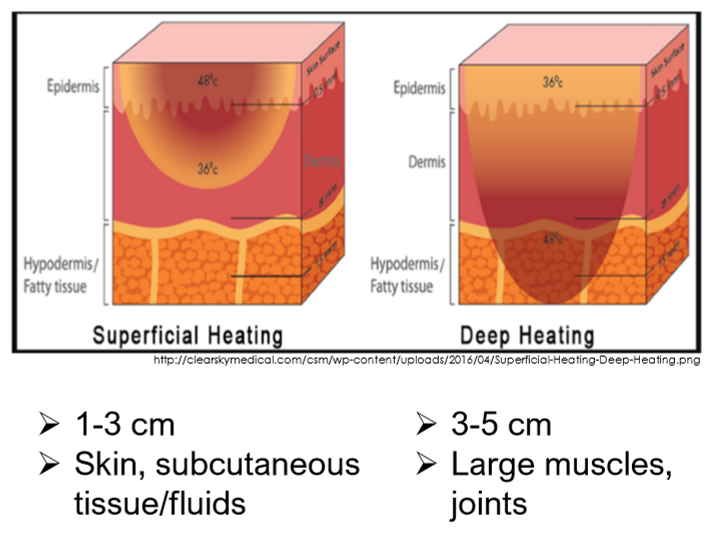
continuous ultrasound and continuous shortwave diathermy are examples of ___
DEEP
T/F: In applying paraffin to a patient's hand, it is important to remove any jewelry due to the high thermal conductivity of metal.
TRUE
T/F: the total amount of heat transferred is the same when comparing a thermal agent applied to the entire quad muscle versus the biceps muscle
FALSE
T/F: placing 6-8 layers of towels between hot pack and skin decreases the heat conduction
TRUE
convection is a ___ medium and a material of a different temperature
CIRCULATING
which is faster when comparing same start temps: convection or conduction?
CONVECTION
fluidotherapy and whirlpool are examples of ___ modalities
CONVECTIVE
this is energy transfer without contact or intervening material
RADIATION
radiation rate depends on... (4)
-radiation intensity
-size and source
-treatment area
-distance and angle between source and treatment area
infrared lights are examples of ___
radiation
conversion of non thermal energy into heat without direct contact
conversion
mechanical example of conversion?
ultrasound
electrical example of conversion?
diathermy
chemical example of conversion?
cold pack activated by striking
process of a liquid changing to a gas (COOLING ONLY!!)
evaporation
vapocoolant sprays evaporate at a (lower/higher) temp than water
LOWER - contact with warm skin causes liquid to change to gas and leaves skin cooler
would water or an air-based thermal agent be applied at a lower
temperature to achieve the same thermal effects?
WATER
the amount of energy required to raise the temperature of a unit of mass of a material by 1°C
specific heat
a higher specific heat means that (more/less) energy is required to heat up
MORE!!! can also hold more energy at a given temp
what has a higher specific heat: water or air?
WATER!! (highest)
arrange these in order of low specific heat to high: muscle, fat, bone
BONE, FAT, MUSCLE
immersion in a whirlpool will heat a patient's skin (more/less) rapidly than immersion in a bowl of water of the same termpature
MORE
blood circulating in the body also transfers heat by ____ to reduce local changes in tissue temperature
CONVECTION
NEED SLIDE 18 ANSWERS
indications for therapeutic heat
-decrease pain
-muscle spasm
-joint stiffness
-increase soft tissue extensibility and ROM
-general relaxation
-MAY decrease effects of DOMS
ultrasound and diathermy are examples of (deep/superficial) heating agents
DEEP
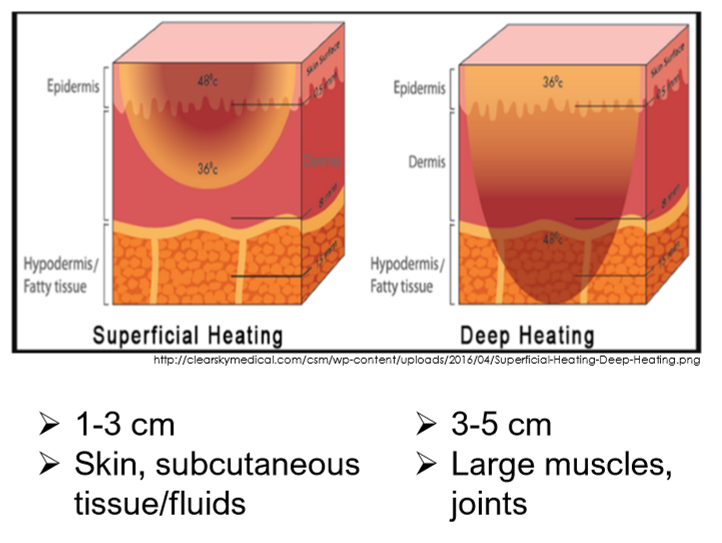
hot packs, paraffin, infrared, fluidotherapy, and hydrotherapy are examples of (deep/superficial) heating agents
SUPERFICIAL
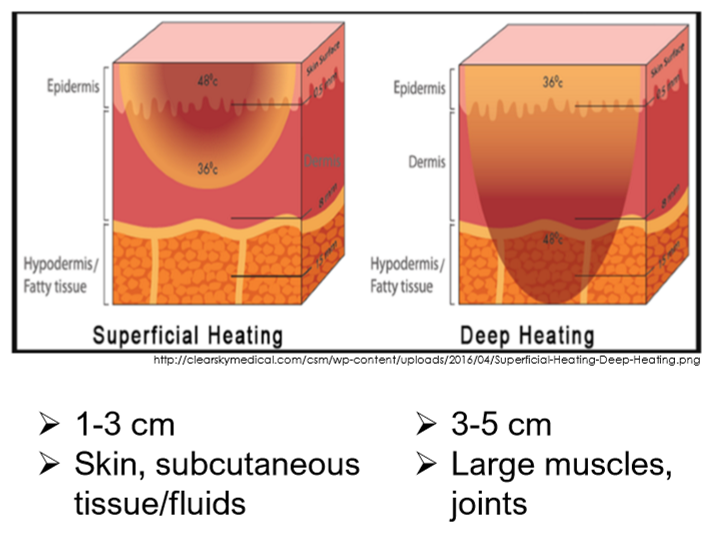
moist heat is going how deep???
1-3 cm (SUPERFICIAL)
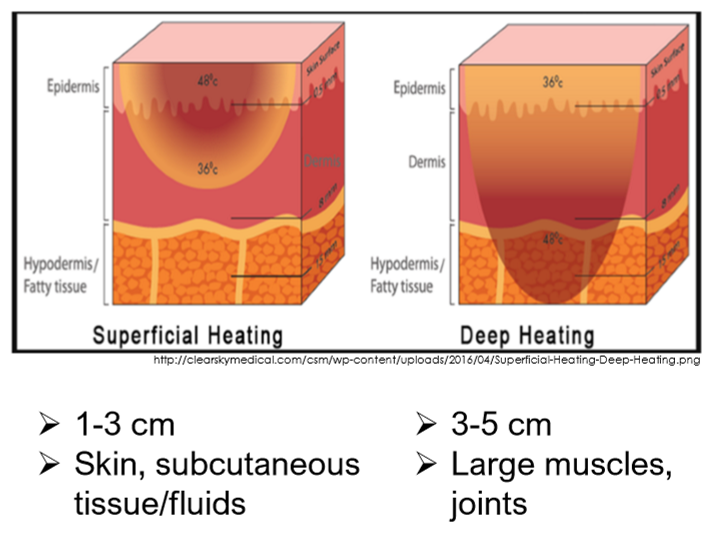
tissue temperature must be elevated to ____ to provide a therapeutic effect
104-113°F **IMPORTANT
the greater the area being heated, the (greater/less) the physiological changes
GREATER!! **important
effects of heat (4)
-vascular/hemodynamic
-neuromuscular
-metabolic
-altered tissue extensibility
main vascular effect of heat?
VASODILATION!!!
are superficial heating agents going to the depth of skeletal muscle blood flow?
NO!! exercise is better!
increased metabolic reactions - vascular effects of heat
-icnreased metabolic rate + chemical mediators
-increased oxygen for repairs
neuromuscular effects of heat
-incrased nerve conduction velocity (incr theromreceptors at skin, decr nociceptive afferents at dorsal horn)
-decreased pain
-psychosomatic effects
heat (increases/decreases) nerve conduction velocity
INCREASES (only in health nerve tissue)
heat (increases/decreases) nociceptive afferents at dorsal horn
DECRASES
heat activates spinal pain gating mechanism which increases thermoreceptors and decreases what? (2)
muscle spasms and ischemia
immediately after heat, muscles are (weaker/stronger)
WEAKER!!!! ~30 min, then gradually stronger up to 2 hrs
(exercise/superficial heat) is better to increase blood flow to muscles
EXERCISE!
past ___° tissues will burn ***
113°
heat increases ___ extensibility
COLLAGEN
heat applied to soft tissues prior to or while stretching...(3)
-maintains greater increase in length
-requires less force
-decreases risk of tissue tearing
to increase extensibility of soft tissue with heat, tissue temperature must be maintained at ____° for ____ minutes
104-113° for 5-10 minutes
to cutaneous scar tissue and superficial tendons and muscles, we would apply (superifcial/deep) heating techniques
SUPERFICIAL (hot packs, paraffin, infrared lamps)
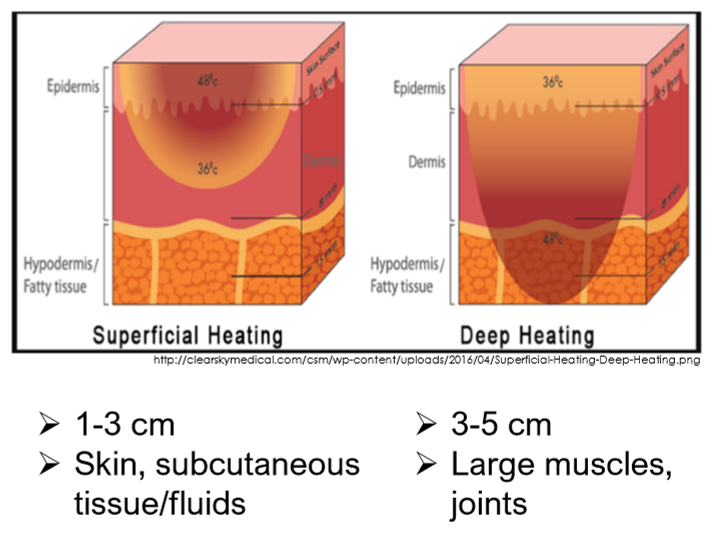
to jjoint capsules of large joints, deep tendons, or muscles we should apply (superficial/deep) heating techniques
DEEP (diathermy, US, exercise)
does literature show heat is effective for pain?
YES!! superior to NSAIDs for LBP
in the research, was heat shown to affect HS flexibility?
NO! research is mixed on heat and tissue flexibility
in the research, were thermal agents effective for DOMS?
heat wrap was good.....but is it the heat or the compression?
contraindications for therapeutic heat
-impaired sensation
-vascular disease/insufficiency
-thrombophlebitis/DVT
-over recent or potential hemorrhage
-over area of known malignancy
-over infected area
-over lidocaine patches
-impaired cognition
do we need to test sensation for therapeutic heat?
YES!!
precautions for therapeutic heat
-over area of acute injury/inflammation
-over abdomen/low back during pregancy
-impaired circulation
-metal in area
-area of edema
-area where liniments or heat rubs were recently applied
-cardiac insufficiency (monitor vitals!)
-over open wound
-demyelinated nerves
can we use paraffin over an open wound?
NO!!!
adverse effects (3)
-burns
-fainting
-bleeding
this adverse effect may happen due to cell death secondary to protein denaturation from what being too hot or on too long
BURNS!
this adverse effect may be caused by vasoldilation; avoid in acute trauma, hemophilia, and recent vascular lesions
BLEEDING
this adverse effect may be caused by peripheral vasodilation, decreased blood pressure, and heart rate
FAINTING
SLIDE 39 important
hot packs must be stored at what temperature?
158-167°F
for a hot pack, there must be __ layers of toweling
6-8
in a hot pack with a cover, there must be ___ layers of toweling
2-3
what do we need to check prior to application of heat?
SENSATION
do we need to remove jewelry and any clothing that contains metal before using hot pack?
YES!!!!
hot pack procedure flow
check skin --> 5 minute check --> apply for up to 20 min --> check area afterwards
peak heat from a hot pack is achieved in __ minutes
5!! MUST DO 5 MIN CHECK-IN
paraffin has a low specific heat (125-134°), what does this mean?
doesn't feel as hot as water at same temp & conducts heat more slowly to decrease the risk of burn
if a patient cannot get their rings off, are they still able to do paraffin?
NO!!
to do before applying paraffin
-check sensation!!
-explain treatment + provide call bell
-remove jewelry, check skin, wash and dry area
dip-wrap method for paraffin
-dip hand info paraffin with fingers apart --> lift and wait until wax becomes opaque and stops dripping --> repeat 6-10 times --> wrap in plastic --> cover with towel --> leave on until wax cools --> peel off and discard --> INSPECT SKIN!!
how many times to do we dip into paraffin for the dip-wrap method?
6-10 times
dry heating agent where heated air circulates ground cellulose particles (corn cobs) around extremity (particles act like fluid)
fluidotherapy
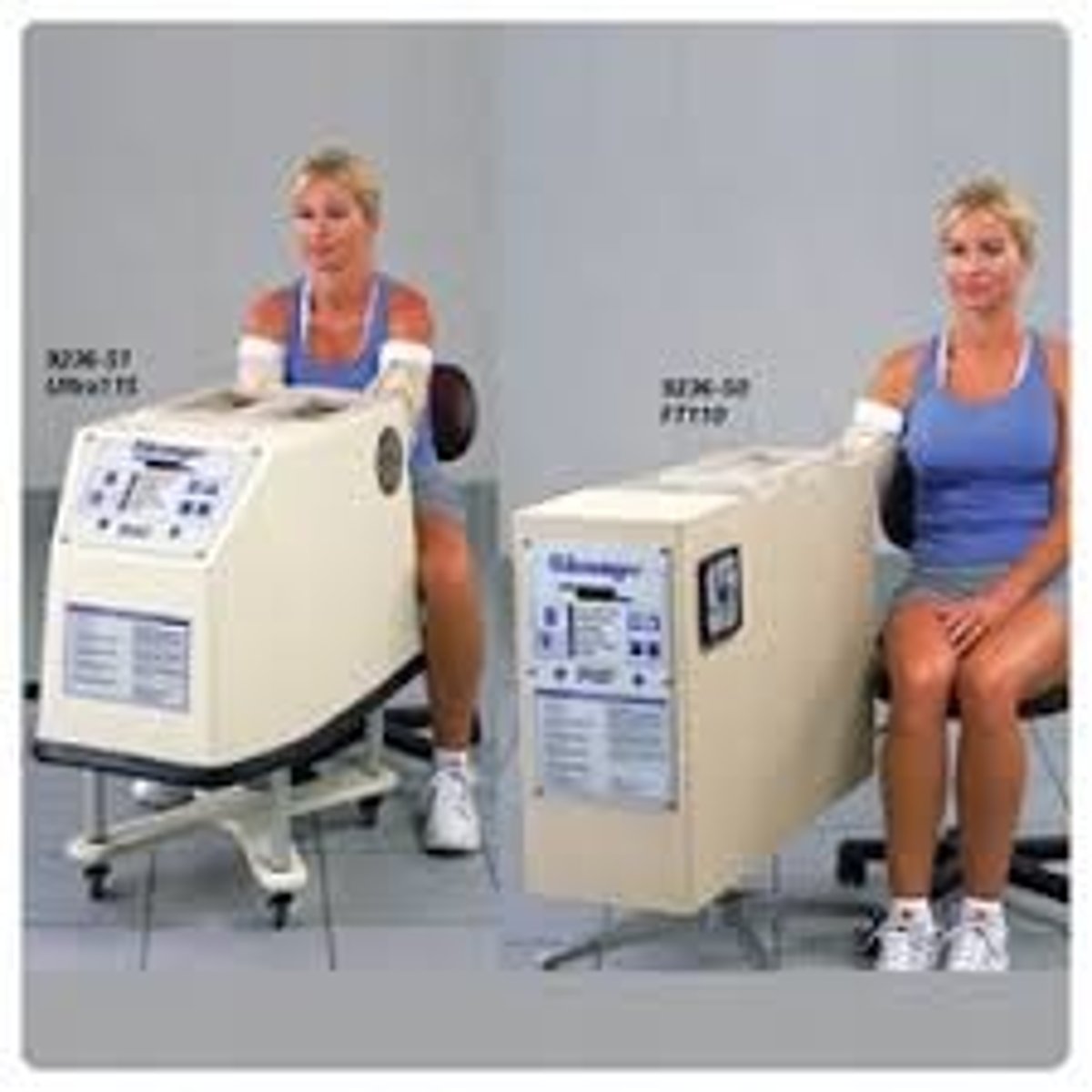
T/F: during fluidotherapy, patient can perform ROM during the treatment
YES!!
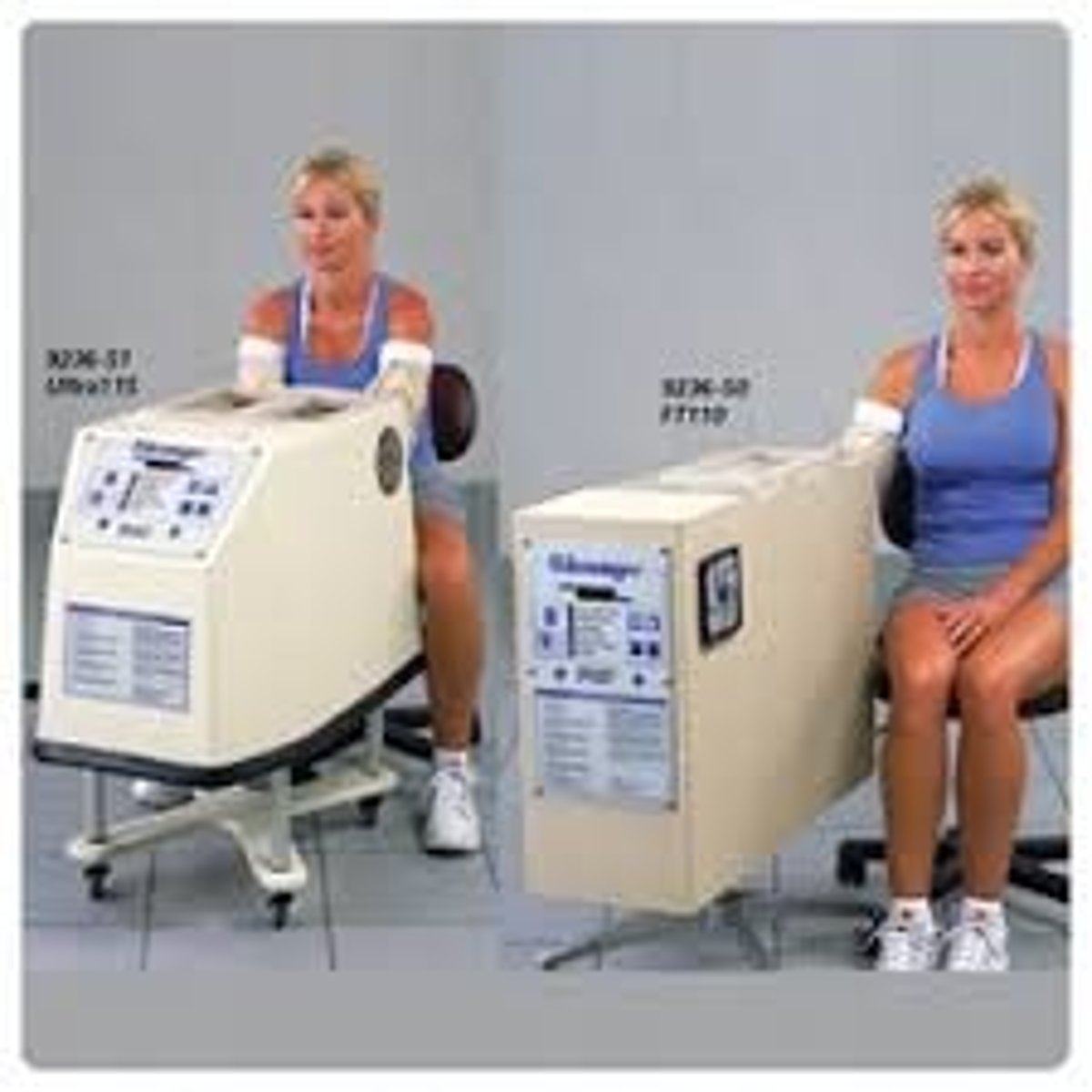
how long is fluidotherapy applied for?
20 min
does cryotherapy add cold?
NO!!! IT REMOVES HEAT
clinical indications of cryotherapy
-inflammation
-pain
-edema
-reduce spasticity
-facilitation of movement
-increase pain threshold
cooling is depndent on... (5)
-temperature difference between objects
-time of exposure
-conducitivty of tissue
-type of agent
-total body surface being cooled
higher water content of a tissue has (better/worse) thermal conductivity
BETTER!!
adipose tissue is an insulater, this means it (resists/absorbs) heat or cold
RESISTS!!!!
effects of cold therapy (3)
-hemodynamic
-neuromusclar
-metabolic
more drastic the difference between body temp and cooling agent, the (more/less) drastic the effects will be
MORE!!!!
hemodynamic effects of cold is immediate ____
VASOCONSTRICTION!! (decrease blood flow!!)
direct and indirect mechanisms of hemodynamic effects of cold
-smooth muscle of blood vessel walls contract
-decreased production of vasodilator mediators
-increased blood viscosity
-reflexes causing vasoconstriction
what happens after 5-10 minutes of cold application
cold-induced vasodilation (CIVD) -- protective role against cold injury! vasconstriction then occurs after a few minutes
limit cold (below 50°) to ___ to limit vasodilation
10-15 minutes